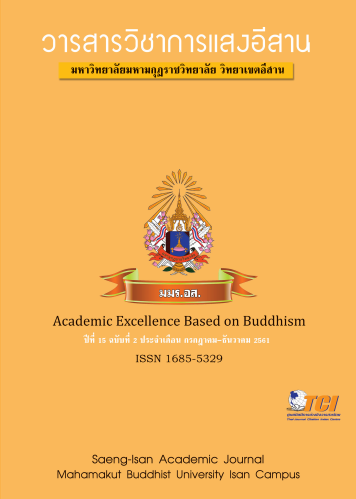Boosting English Teaching Skills and Techniques for Primary Teachers through Professional Learning Communities (PLC) Training Program
Boosting English Teaching Skills and Techniques for Primary Teachers through Professional Learning Communities (PLC) Training Program
คำสำคัญ:
Keywords: Professional training program, Professional Learning Communities (PLC), English teaching training program, professional development for teachersบทคัดย่อ
Abstract
The purpose of this research was to study the satisfaction level of the administrators as well as the teachers with the professional learning communities training on English teaching practice for element teachers in Nakhonpathom, Thailand. This pilot study is considered as a quantitative research using the questionnaire. The sample of the study was the administrators and non-English major teachers in the primary schools of Nakhonpathom province, Thailand, who participated in the Professional Learning Communities training. Statistical methods included a percentage, mean, and standard deviation. The reliability of the questionnaire is .85.
The research findings indicated that the overall satisfaction on the training program management as well as other concerns were at the high and highest levels. The results of the study were ordered ranging from the highest to the least level: 1) the participants’ personal details, 2) the knowledge and information about the Professional Learning Communities (PLC), 3) the problem and solution on English teaching in primary schools, 4) the knowledge of English teaching techniques, 5) the overall management of the program. The study suggests that there should be continuous training programs for the administrators and teachers through different English teaching methods and approaches for both English major teachers and non-English major teachers.
Keywords: Professional training program, Professional Learning Communities (PLC), English teaching training program, professional development for teachers
เอกสารอ้างอิง
Alexander, A. et al;. (2003). Motivation and barrier to participation in virtual knowledge sharing
teams. Available from https://warwick.ac.uk/fac/soc/wbs/conf/olkc/ archive/oklc3/id78.pdf .Internet access September, 2, 2018.
Alexandra Ardichvili. (2008). Learning and Knowledge Sharing in Virtual Communities of Practice:
Motivators, Barriers, and Enablers. Advances in Developing Human Resources Vol.10 No, pp.541-554.
Bhikku Puyutto PA. (2012). Buddha-Dharma. Extended Edition. Bangkok: Phali-Dharma.
Choochat Phuangsomjit. (2017). Professional Learning Community and Guidelines for Application in
Educational Institutions. Department of Basic Education, Republic of South Africa.
Cynthia Luna Scott. (2015). The future of learning 3: what kind of pedagogies for the 21st century?.
UNESCO Education Research and Foresight. Paris. p.3.
Etienne Wenger. (2011). Communities of practice: a brief introduction. Communities of practice 1 A
brief introduction-V, pp.1-8.
Etienne and Beverly Wenger-Trayner. (2015). Communities of practice: a brief introduction.
Available from http://wenger-trayner.com/wp-content/uploads/2015/04/07-Brief-introduction-to-communities-of- practice.pdf. Internet access September,2, 2018.
Helen Timperley. (2011). A background paper to inform the development of a national professional
development framework for teachers and school leaders. 1st Edition. Melbourne: The Australian Institute for Teaching and School Leadership (AITSL).p.8.
James C. Toole and Karen Seashore Louis. (2002). Second International Handbook of Education
Leadershipand Administration. 1st Edition. Dordrecht: Academic Publishers.pp.1-12.
James C.Toole and Karen Seashore Louis. (2002). The Role of Professional Learning Communities in
International Education. Available from https://www.researchgate.net/profile/Karen_Louis/publication/ 226317988_The_Role_of_Professional_Learning_Communities_In_International_Education/links/5474c3a80cf2778985ac0c06/The-Role-of-Professional-Learning-Communities-In-International-Education.pdf. Internet access September,5, 2018.
Joseph, A. et al;. (2015). Professional Learning Communities Facilitators’ guide for the What Works
ClearingTM Practice Guide: Teaching Academic Content and Literacy to English Learners in Elementary and Middle School. Available from http://www.academy publication.com/issues/past/jltr/vol04/06/29.pdf. Internet access September,2, 2018.
Marlie L. Williams. (2010). Teacher Collaboration as Professional Development in a Large, Suburban
High School. Doctor of Philosophy, University of Nebraska-Lincoln.
Newmann Fred. M. and associates. (1996). Authentic achievement: Restructuring schools for
intellectual Quality. 1stEdition.San Francisco: Joess-Bass.
Peter, H. et al;. (2013). Learning about being effective mentors: Professional learning communities
and mentoring. Procedia-Social and Behavioral Sciences 93, pp.1291-1300.
Plernta, P. et al;. (2017). The Integrated Education Model of Professional Learning Community,
Coaching, Reflection and Power Question of the Nursing Colleges, Praboramarajchanok Institute. Journal of Nursing journal of the Ministry of Public Health, Vol.27.no.1.p.62.
Phongsakorn, M. et al;. (2011). Critiquing ELT in Thailand: A reflection from history to practice.
Journal of Humanities,8(2).pp.57-67.
Sripathum Noom-ura. (2013). English-Teaching Problems in Thailand and Thai Teachers’
Professional Development Needs. English Language Teaching; Vol.6, no.1.pp.139-147.
UNESCO. (2014). UNESCO education strategy 2014-2021. 1st Edition. Paris: the United Nations
Educational, Scientific and Cultural Organization.p.16.
Vicki, V. et al;. (2007). A review of research on the impact of professional learning communities on
teaching practice and student learning. Teaching and Teacher Education 24(1).pp.80-91.
Ying Zhao. (2013). Professional Learning Communities and College English Teachers’ Professional
Development. Journal of Language Teaching and Research. Vol.4.no.6.pp.1365-1370.
ไฟล์ประกอบ
เผยแพร่แล้ว
ฉบับ
ประเภทบทความ
สัญญาอนุญาต
เนื้อหาและข้อมูลในบทความที่ตีพิมพ์ในวารสาร ถือเป็นข้อคิดเห็นและความรับผิดชอบของผู้เชียนบทความโดยตรง ซึ่งวารสารไม่มีส่วนเกี่ยวข้อง นอกจากนั้น ผู้เขียนทุกท่านต้องยืนยันว่าบทความต้นฉบับที่ส่งมาตีพิมพ์เผยแพร่นั้น จะต้องไม่เป็นบทความที่กำลังอยู่ในการพิจารณาเพื่อตีพิมพ์ในวารสารอื่นหรือเคยตีพิมพ์เผยแพร่มาแล้ว หากมีการใช้ภาพ ข้อความหรือตารางของผู้เขียนหรือผู้นิพนธ์ท่านอื่น ผู้เขียนจะต้องอ้างแหล่งที่มาหรือเจ้าของลิขสิทธ์
Publication Ethic:
The detail published in Saeng Isan Journal is opinion and responsibility of the authors, and it is not relevant with the jouranl. Besides, the authors must certify that the original manuscript is not in the process to publish in other journals or used to publish in other journals. If the authors use paragraphs, pictures or tables from others, the athours must refer to the original sources.
Article Consideration:
Each article will be published by a panel three journalists with expertise in relevant fields, and get the editorial approval before publishing. The review is in the form of The article's double blind.
To comply with copyright law. The author must sign the copy of the article submission form to the journal. In addition, the author must confirm that the original article submitted to the journal is only one publication in Saeng Isan Journal. If the images or tables of other authors appearing in other publications are used, the author must ask permission of the copyright owner before publishing.


